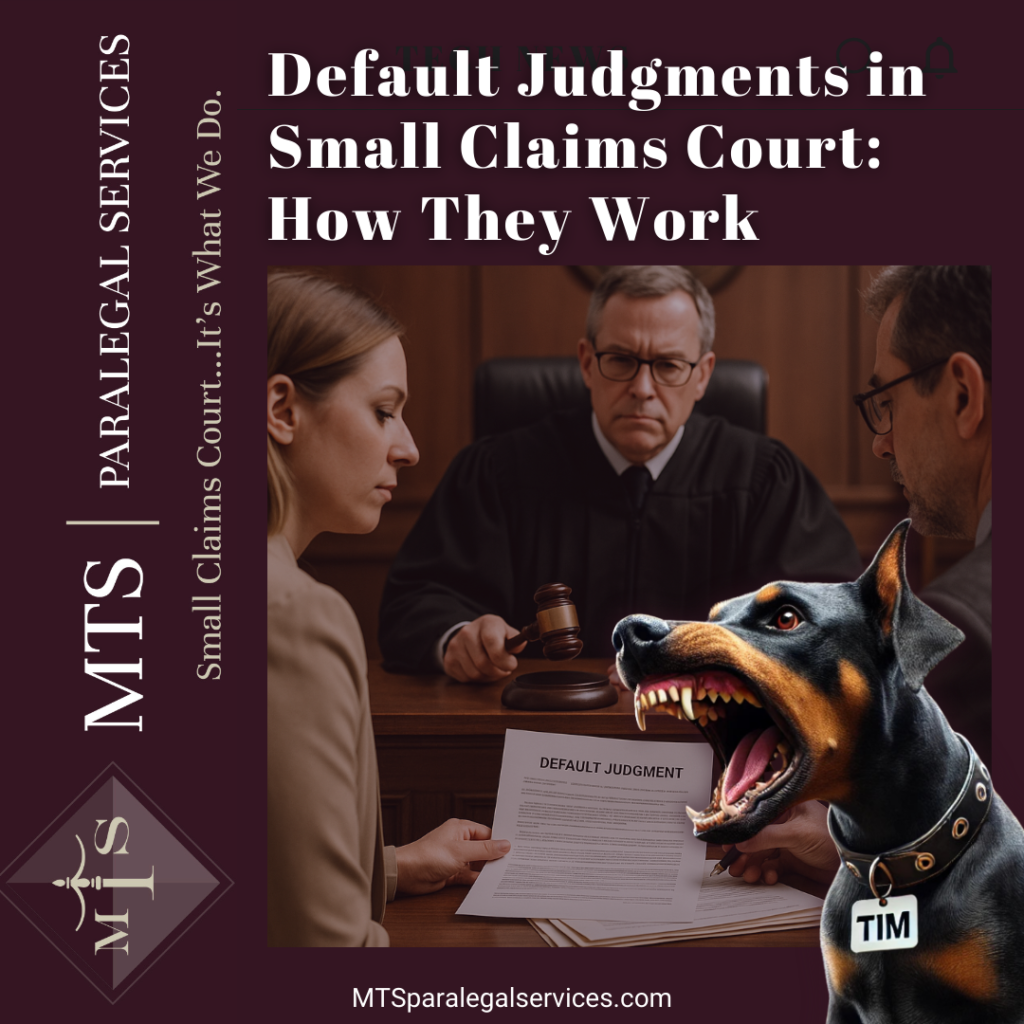
Default Judgments in Small Claims Court: How They Work
Default Judgments in Small Claims Court: How They Work
Ontario’s Small Claims Court is designed to provide an efficient forum for resolving civil disputes. However, not every defendant participates in the litigation process. When a defendant fails to file a defence within the prescribed timeline, the plaintiff may be entitled to obtain what is known as a default judgment. Default judgments are a procedural mechanism that allows the court to resolve a claim without the defendant’s active involvement. MTS Paralegal Services, a professional paralegal firm in Ontario, regularly advises litigants on the intricacies of default proceedings and assists in securing or challenging such judgments.
The Legal Framework for Default Judgments
Default judgments are governed by the Rules of the Small Claims Court, enacted under the Courts of Justice Act. When a defendant has been properly served with a claim but does not file a defence within twenty days, the plaintiff has the option to seek judgment in default. This rule exists to promote procedural efficiency and discourage defendants from ignoring legitimate legal actions.
The process distinguishes between liquidated and unliquidated claims. A liquidated claim involves a specific, readily ascertainable amount of money, such as unpaid invoices. In these cases, the clerk of the court may enter default judgment without judicial assessment. Conversely, unliquidated claims, such as those involving damages for negligence or breach of contract where the amount is not fixed, require the plaintiff to attend an assessment hearing before a deputy judge to establish the appropriate quantum of damages.
Requirements for Obtaining a Default Judgment
Before a default judgment can be granted, certain procedural requirements must be satisfied. These include:
- Proof of Service – The plaintiff must file an Affidavit of Service confirming that the claim was served in accordance with the rules. Improper service can render a default judgment vulnerable to being set aside.
- Affidavit of Default – The plaintiff is generally required to file an affidavit confirming that the defendant has not filed a defence within the allotted time.
- Supporting Documentation – In liquidated claims, invoices, contracts, or account statements should be filed to substantiate the amount claimed.
Tim at MTS Paralegal Services often assists clients in preparing and filing these documents to ensure compliance with procedural requirements.
Assessment Hearings for Unliquidated Claims
In cases where damages are unliquidated, the court will schedule an assessment hearing. During this hearing, the plaintiff must present evidence to substantiate the claimed amount. The deputy judge assesses the credibility of the evidence and determines the appropriate quantum of damages. This process highlights the importance of preparing documentary, testimonial, and, if necessary, expert evidence. Tim at MTS Paralegal Services is equipped to represent clients in such hearings, ensuring that their claims are presented persuasively.
Setting Aside a Default Judgment
A defendant who has had a default judgment entered against them is not without recourse. The Rules of the Small Claims Court allow for a motion to set aside a default judgment. The defendant must establish that:
- The claim was not properly served, or
- There is a reasonable explanation for the failure to defend, and
- The defendant has a meritorious defence.
The court exercises discretion in determining whether to set aside a judgment, often weighing the interests of justice against the need for procedural efficiency. Tim at MTS Paralegal Services provides representation to both plaintiffs seeking to uphold default judgments and defendants seeking to have them set aside.
Enforcement of Default Judgments
Once a default judgment has been obtained, it is enforceable in the same manner as any other court judgment. This may include garnishment of wages, seizure and sale of assets, or filing a writ of seizure and sale with the sheriff. The judgment creditor must follow specific enforcement procedures, and improper enforcement steps may delay recovery. Professional assistance is valuable to navigate this phase effectively.
Strategic Considerations
While default judgments may appear straightforward, they are not guaranteed. Procedural missteps, such as defective service or incomplete affidavits, may undermine the enforceability of the judgment. Furthermore, an improperly prepared claim may result in reduced damages at an assessment hearing. Engaging an experienced licensed paralegal, such as Tim at MTS Paralegal Services, significantly increases the likelihood of obtaining and enforcing a valid judgment.
Professional Support from MTS Paralegal Services
Default judgments are an important tool in Ontario’s Small Claims Court, which now has a monetary jurisdiction of up to $50,000. These judgments require strict compliance with procedural rules and evidentiary standards to be valid and enforceable.
Plaintiffs must act promptly, keeping in mind that the 20-day period for a defendant to file a defence begins only after proper service of the claim. Any missteps in service, timelines, or documentation can jeopardize the judgment or delay enforcement.
Defendants facing a default judgment need immediate assistance to determine whether there are grounds to have the judgment set aside and to prepare a strong response.
MTS Paralegal Services provides professional guidance to both plaintiffs and defendants, helping clients navigate every stage of the process — from preparing claims and affidavits to challenging or enforcing default judgments. With timely action and strategic representation, clients can protect their rights and ensure their case is handled properly.
Tim at MTS Paralegal Services, located in Kitchener, provides professional representation in matters involving default judgments, including preparation of affidavits, attendance at assessment hearings, and enforcement proceedings. For knowledgeable support tailored to Ontario Small Claims Court, contact MTS Paralegal Services at https://mtsparalegalservices.com/.
This content does not constitute legal advice. For up-to-date guidance or legal advice specific to your situation, please contact MTS Paralegal Services or call (226) 444-4882.
